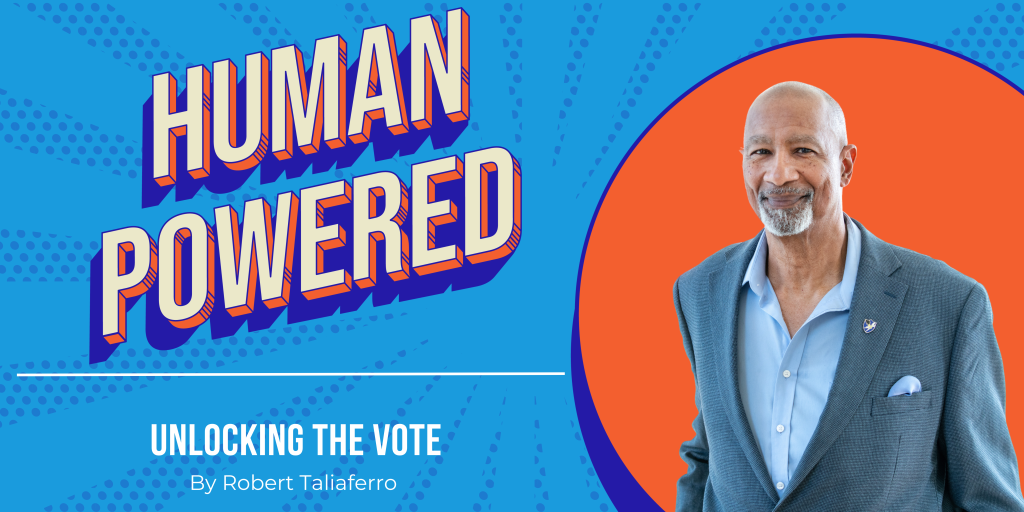Robert Taliaferro is an artist and community activist currently living in Minnesota after serving over 38 years of confinement. From 1985-1989 he edited The Prison Mirror newspaper at the Minnesota Correctional Institution at Stillwater. Robert is the author of Always Color Outside the Lines: Freedom for the Artist Within. Robert received a B.A. in 2023, was named outstanding student for the College of Individualized Studies, and gave the Spring 2023 commencement address at Metro State University in St. Paul, MN. He is also a member of an advisory committee with the Pollen Initiative to reinstitute the American Penal Press Awards to recognize journalistic excellence within the American prison system.
Taliaferro is featured in episode 3, "Three Convicts, Twenty Dollars, and a Newspaper."
Unlocking the Vote: Why Restoring Voting Rights is Essential for Rehabilitation and a Stronger Democracy
By Robert Taliaferro
For millions of Americans who have encountered the carceral system, the fundamental right to vote is stripped away. While the specifics of disenfranchisement laws vary from state to state, the impact remains consistent: a sense of voiceless otherness that creates a barrier to full reintegration into the community, while weakening the very essence of our democracy.
For me, after serving over 38 years in the Wisconsin prison system, the act of disenfranchisement is literal: before I got out, I had to sign a piece of paper that stated that I would not vote. This bureaucratic requirement underscores the systemic nature of disenfranchisement, a system that seeks to silence and marginalize individuals even after they have served their time.
What’s so frustrating is that I am paroled in Minnesota where the state legislature, shortly after I was released, reinstated the right to vote for all adults who are currently on supervised release. I have the right to vote in Minnesota where I live, but it would be a parole violation for me if I voted, because of the dual Wisconsin jurisdiction over my release.
Wisconsin Humanities’ Human Powered: Humanity Unlocked podcast, hosted by public historian Adam Carr and Wisconsin Poet Laureate, Dasha Kelly Hamilton, includes a timely episode about the right to vote for people who have been incarcerated. This episode points to the lack of voting rights for thousands of Wisconsin citizens who have been disenfranchised due to felony convictions. Especially poignant this year is the fact that a former president, having been convicted of felonies that would preclude him from voting in several states, could very well be reelected to the highest office in the country.
The podcast features statements from Josh Wells, Shannon Ross, and Andron Lane. Josh had been living in Indiana where he was allowed to vote, but when he returned to Wisconsin, that right was denied. "[W]hen I did come to the state.” Josh noted, “There was a little bit of that sense of, well, that particular freedom's gone for a while.”
Andron, on the other hand, completed the conditions of his parole so that his civil rights were restored. “For the first time ever in my life,” Andron states, “I’m able to vote, able to be considered as a citizen in society.”
In Wisconsin, there are about 60,000 people on supervision. Jerome Dillard, Director of EXPO (Ex-Incarcerated People Organizing) says, "The fact of the matter is...when you can't cast a ballot, you don't pay attention to politics and what's going on." He believes that being denied the right to vote is akin to being "locked up on the outside,” and creates a kind of confinement that extends far beyond physical bars. This sentiment is echoed by Shannon, who, having spent years unable to vote, confesses to feeling a sense of apathy, questioning, "Who cares? It's like, you know, I'm not a part of society."
Dasha connects this directly to the power of finding one's voice: "If we establish the humanity of people who were incarcerated then how can we deny them the fundamental right of voting and being seen as a functioning member of society?"
Granting incarcerated, and formerly incarcerated persons, the right to vote can lead to more representative policies that address the root causes of crime, such as poverty, lack of education, trauma, and limited access to opportunity.
When we empower individuals to participate in the democratic process, we foster a sense of responsibility and accountability, encouraging them to become active and engaged members of their communities. This, in turn, strengthens the very fabric of our democracy, creating a more inclusive and representative society.
As Human Powered: Humanities Unlocked podcast points out, storytelling, poetry, art, and the vote are human expressions that can help to dismantle the stigma associated with incarceration, and in so doing, we can inspire action and create a more just and equitable society for all.


